Iran Rejects IAEA Demand To Access Karaj Nuclear Workshop
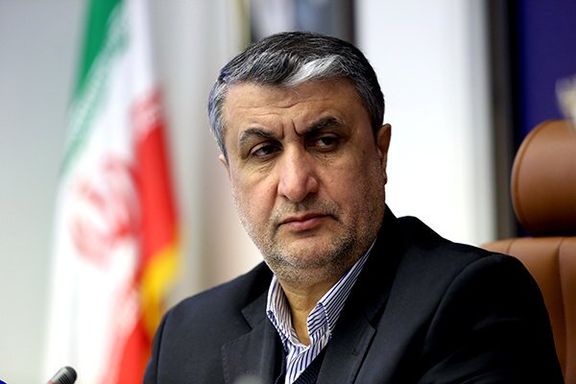
Iran's nuclear chief said Tuesday demands by the UN nuclear watchdog IAEA for access to a workshop making centrifuges are beyond NPT and unacceptable to Tehran.

Iran's nuclear chief said Tuesday demands by the UN nuclear watchdog IAEA for access to a workshop making centrifuges are beyond NPT and unacceptable to Tehran.
He was referring to an installation in Karaj, west of Tehran that was the target of a sabotage attack in June, IAEA monitoring cameras were damaged in the incident and Iran has been refusing access fro the UN watchdog to replace the equipment.
"Karaj ... is outside of safeguards ... We act within the framework of safeguards and NPT (nuclear Non-Proliferation Treaty) and do not accept anything else," the head of Iran's Atomic Energy Organization, Mohammad Eslami, said.
Eslami said that monitoring in the Karaj facility is related to the 2015 nuclear agreement, JCPOA, and when the United States has withdrawn from the agreement and imposed sanctions, Iran has no reason to cooperate.
The IAEA has said that without access to the Karaj facility, it cannot guarantee of being fully informed about Iran’s nuclear activities.
Nuclear talks underway since April in Vienna to restore the JCPOA have so far failed to make breakthrough. The United States and its European allies have become pessimistic over Iran’s negotiating posture.
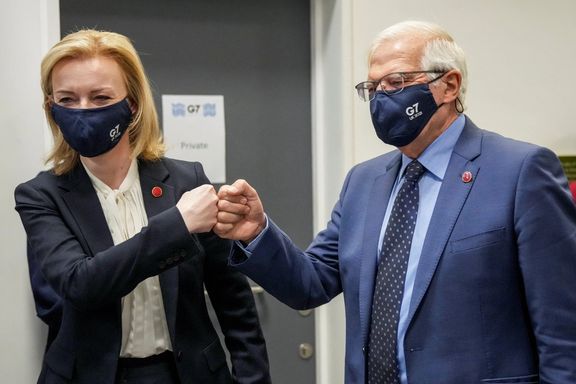
Western diplomats say they still have not had real nuclear negotiations with Iran, and unless there is swift progress that deal will soon be "an empty shell.”
Diplomats from the United Kingdom, France and Germany, forming the E3 group in the Vienna talks with Iran to revive the 2015 deal, expressed their concerns in a joint statement on Monday.
"As of this moment, we still have not been able to get down to real negotiations," the statement said. "Time is running out. Without swift progress, in light of Iran's fast-forwarding of its nuclear program, the JCPOA will very soon become an empty shell," they said, using the deal's full name, the Joint Comprehensive Plan of Action.
Iran returned to the talks at the end of November after suspending participation for five months. The new negotiating team representing hardline president Ebrahim Raisi refused to continue the talks on the basis of understandings reached in the previous rounds from April to June. They put forth new demands, which the United States and the E3 dismissed.
As time passes without an agreement, Iran continues to enrich uranium to 60-percent purity, getting closer to a level when it would need only weeks to have a large enough stockpile for a nuclear bomb.
With reporting by Reuters
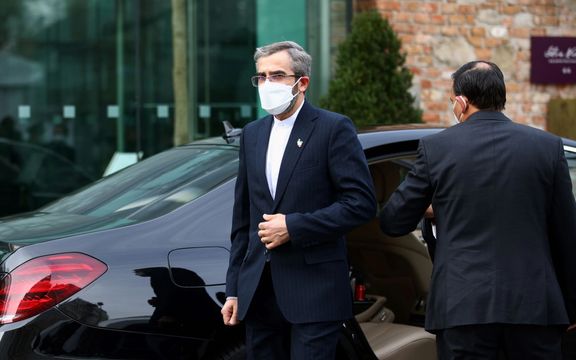
With signs that the Iran nuclear talks in Vienna are a bit more serious than two weeks ago, pundits are queuing to proclaim a softening in Tehran’s stance.
Iran's lead negotiator, Ali Bagheri-Kani told state television Sunday the atmosphere in Vienna was "very serious and based on mutual respect with the approach that [all] sides want to reach an agreement." He said Iranian negotiators remained committed to the framework of the 2015 deal, the JCPOA (Joint Comprehensive Plan of Action).
Bagheri-Kani denied that Iran had withdrawn from any earlier stances. He made no mention of three issues raised by Tehran when talks resumed two weeks ago: compensation for the billions of dollars in damages caused by United States ‘maximum pressure’ sanctions after the US left the JCPOA in 2018, guarantees that the US would not again quit the agreement, and procedures for verifying the lifting of sanctions
Iran's state media today has focused more on the European JCPOA signatories − France, Germany and the United Kingdom members in its criticism and less on the US. "The stance of the European countries is even greedier than the American side," the Tasnim news agency Sunday quoted a “source close to Iranian negotiators” as saying. The US takes part in the Vienna talks indirectly.
The official news agency (IRNA) also quoted an “informed source” in an unattributed commentary Monday headlined "Negotiators Beat Western Media Sabotage Attempts.” This highlighted negative reports in western media, after the first week of resumed talks, based on briefings from European officials rubbishing written proposals put forward by Tehran.
"Iran seriously seeks an agreement," the commentary insisted, with the source saying the media briefings had been aimed at pressing Iran into accepting demands beyond the JCPOA. There has been speculation since the talks began in April that the US wanted to extend the length of the JCPOA or add an Iranian commitment to future talks on regional security or to unilateral curbs on its missile defense.
Mikhail Ulyanov, the Russian envoy to the talks who had described Iran's most recent approach to the talks as "unfortunate," told Iran International Sunday that the atmosphere last week was more constructive. "No demarches, no breaks, just normal business-like dialogue," he noted.
In a tweet Sunday Ulyanov said all JCPOA participants – China, France, Germany, Russia, and the United Kingdom plus the United States – had met Sunday evening without Iran to discuss the way ahead. The meeting followed an earlier trilateral meeting of Russia, China, and Iran. Ulyanov also wrote Sunday that for the first time during the seventh round of the talks, which started November 29, a working group on implementation, tasked with sequencing respective steps by Iran and the US to revive the JCPOA, had met.
Some Iranian pundits have also spoken of a softening in the negotiating team's position, possibly due to a greater understanding of the positions of China and Russia.
"It appears that from inside the country [top authorities] have ordered the negotiation team that an agreement must be reached in Vienna," the reformist daily Arman-e Melli quoted Jalal Sadatian, a former ambassador to London, in an editorial headlined “Mandate for Agreement Issued.”
Sadatian suggested this might have followed a failure to gain Chinese support for a tougher stance, and from the US and E3 drawing closer. "It appears that Iran has realized that its maximum demands cannot be met and has therefore accepted to work on the basis of what was previously agreed [in June],” he said.
Talks involving the previous administration led by President Hassan Rouhani went three months − ending in June pending the Iranian presidential election − without reaching agreement.
Others have suggested Iranian negotiators were responding to senior ayatollahs. Foreign Minister Hossein Amir-Abdollahian visited Qom, the main concentration of Iranian Shiite seminaries and senior clerics, just ahead of the latest round of talks. While warning Iranian negotiators to “count their fingers” after dealing with the Western powers, Ayatollah Abdollah Javadi-Amoli told Amir-Abdollahian that Iran should negotiate and couldn’t “live in isolation.”
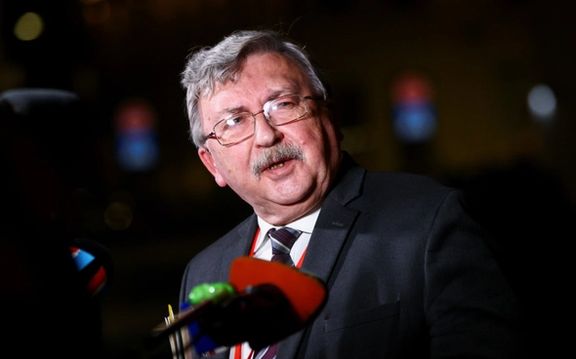
Russia's envoy in Vienna told Iran International TV Sunday that after a rough start last week, Iran's nuclear talks are progressing more constructively.
Mikhail Ulyanov described the atmosphere of this week's talks as much more constructive compared to last week when he said time was wasted. "No demarches… Just normal business-like dialogue," Ulyanov said after a meeting of delegations in an apparent reference to the Iranian negotiators' approach last week.
"We are on the right track, we don't waste time, we maintain dialogue, we arrange meetings at expert level, at higher level, like this one," he said, adding that he was "fully satisfied".
He also noted that as far as he knows, US President Joe Biden is "fully committed to successful conclusion of these talks" and that Biden and Vladimir Putin both want the 2015 nuclear deal, the Joint Comprehensive Plan of Action (JCPOA) to be restored. Ulyanov also said the European Union's External Service was "doing a great job" as a mediator between Tehran and Washington.
Ulyanov stressed that talks are based on the text prepared in June after the six rounds of talks before the Iranian elections. President Ebrahim Raisi’s hardliner government trying to disregard understandings reached in talks during the former Iranian administration insists that current negotiations are based on two texts it presented to the other negotiators last week.
The Group of Seven (G7) foreign ministers meeting in Liverpool Sunday warned Tehran that time is running out to revive the JCPOA. The final communique from the G7 meeting said Iran "must stop its nuclear escalation and seize the opportunity to conclude a deal, while this is still possible.”
Britain, the current rotating president of G7, said the nuclear talks in Vienna that resumed after a five-month hiatus were the Islamic Republic's "last chance to come to the negotiating table with a serious resolution".
"There is still time for Iran to come and agree this deal," British Foreign Secretary Liz Truss told a press conference Sunday while emphasizing that the Islamic Republic will not be allowed to build a nuclear bomb.
Truss was the first among the officials of the JCPOA signatories to give a clear ultimatum to Tehran last week and she repeated the warning on Sunday.
A senior US State Department official said Saturday there was an "intense" conversation among the G7 countries, which were united in their position on the nuclear talks, adding that “time is shrinking, so we're united in that.”
Speaking after meetings with her G7 counterparts in Liverpool, Germany's foreign minister Annalena Baerbock Saturday told reporters that time was running out to revive the nuclear deal with Iran and complained that it had shown in the last days that no progress had been made.
Iran's top negotiator, Ali Bagheri-Kani told the state-run Press TV Sunday that European countries had failed to offer any constructive initiative or proposal. "European parties fail to come up with any initiatives to resolve differences over the removal of sanctions," he said.
Bagheri-Kani also told Press TV that unresolved differences over sanctions have remained from the previous talks held before President Ebrahim Raisi's election. The differences, especially on the nuclear issue, are numerous and varied,” he said.
Bagheri-Kani also told Lebanon's pro-Iranian Al Mayadeen TV Sunday that Tehran's approach during the recent negotiations was successful and good progress was made which will pave the way for "serious negotiations".

Britain once again told Iran on Sunday that this is the last chance for its negotiators to present serious proposals and save the 2015 nuclear deal, the JCPOA.
"This is the last chance for Iran to come to the negotiating table with a serious resolution to this issue, which has to be agreeing the terms of the JCPOA," British Foreign Secretary Liz Truss said.
"This is their last chance, and it is vital that they do so. We will not allow Iran to acquire a nuclear weapon."
Truss had sent the same message to Tehran on December 8, saying “This is really the last chance for Iran to sign up and I strongly urge them to do that because we are determined to work with our allies to prevent Iran securing nuclear weapons," she told the Chatham House think tank.
Negotiation to revive the JCPOA resumed Thursday amid pessimism over Iran’s readiness to embrace understandings reached in earlier talks this year. The new hardliner government in Tehran has adopted a tougher position since after a 5-month interruption the talks reconvened on November 29.
Germany's foreign minister warned Saturday that time was running out to revive the nuclear deal. She was speaking after meetings with her G7 counterparts.
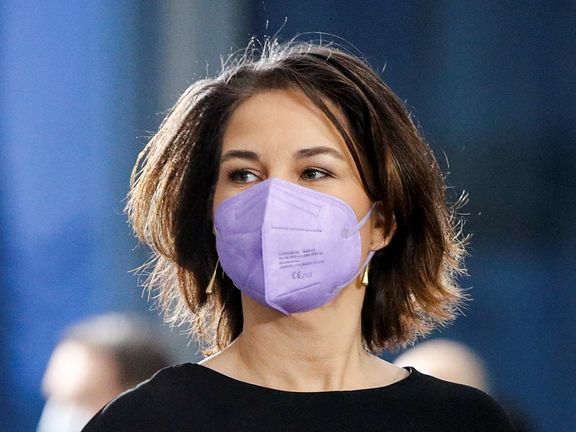
Germany's foreign minister warned Saturday that time was running out to revive the nuclear deal with Iran, speaking after meetings with her G7 counterparts.
Talks have resumed in Vienna to try to revive the 2015 nuclear pact (JCPOA), with both sides trying to gauge the prospects of success after the latest exchanges in the stop-start negotiations.
Iran has presented a tougher position, making new demands, including the removal of all post-2018 US sanctions at once before it would scale back its revamped nuclear program.
"Time is running out," German Foreign Minister Annalena Baerbock told reporters in Liverpool, England where G7 foreign ministers are meeting.
"It has shown in the last days that we do not have any progress."
Baerbock said Iran had resumed the talks with a position that set the negotiations back six months. The current round of talks in Vienna follow a pause of five months after the election of a hardline anti-Westerner as Iran's president, Ebrahim Raisi.
Earlier, US officials said Secretary of State Antony Blinken had held a "productive" meeting with counterparts from Britain, Germany and France on Friday, discussing the way forward for the Iran talks.
A senior State Department official said there was an "intense" conversation among the G7 countries, which were united in their position on the nuclear talks. "The statement will also be strong on the importance of getting Iran back to the table and that it is possible to conclude a deal but that the time is shrinking, so we're united in that," the official, briefing reporters on the condition of anonymity, said.
The official added that US Special Envoy for Iran Robert Malley was heading back to Vienna for talks.
Iranian officials have previously said they were sticking to their tough stance.
Under the original nuclear deal, abandoned in 2018 by then-President Donald Trump, Iran limited its nuclear program in return for relief from U.S., European Union and UN sanctions. The West fears the program would be used to develop weapons, something Tehran denies.
Raisi said on Saturday that Tehran was serious in its nuclear talks in Vienna, the official IRNA news agency reported, but Iranian media have insisted that Iran has not softened its position and remains on what it proposed after talks resumed on November 29. Western negotiators rejected the Iranian position with dismay after the first round of talks ended on December 3.
The indirect US-Iranian talks, in which diplomats from France, Britain, Germany, Russia and China shuttle between them because Tehran refuses direct contact with Washington, aim to get both sides to resume full compliance with the accord.
The G7 meeting which is expected to result in a joint call for Iran to moderate its nuclear program and grasp the opportunity of the Vienna talks.
Reporting by Reuters